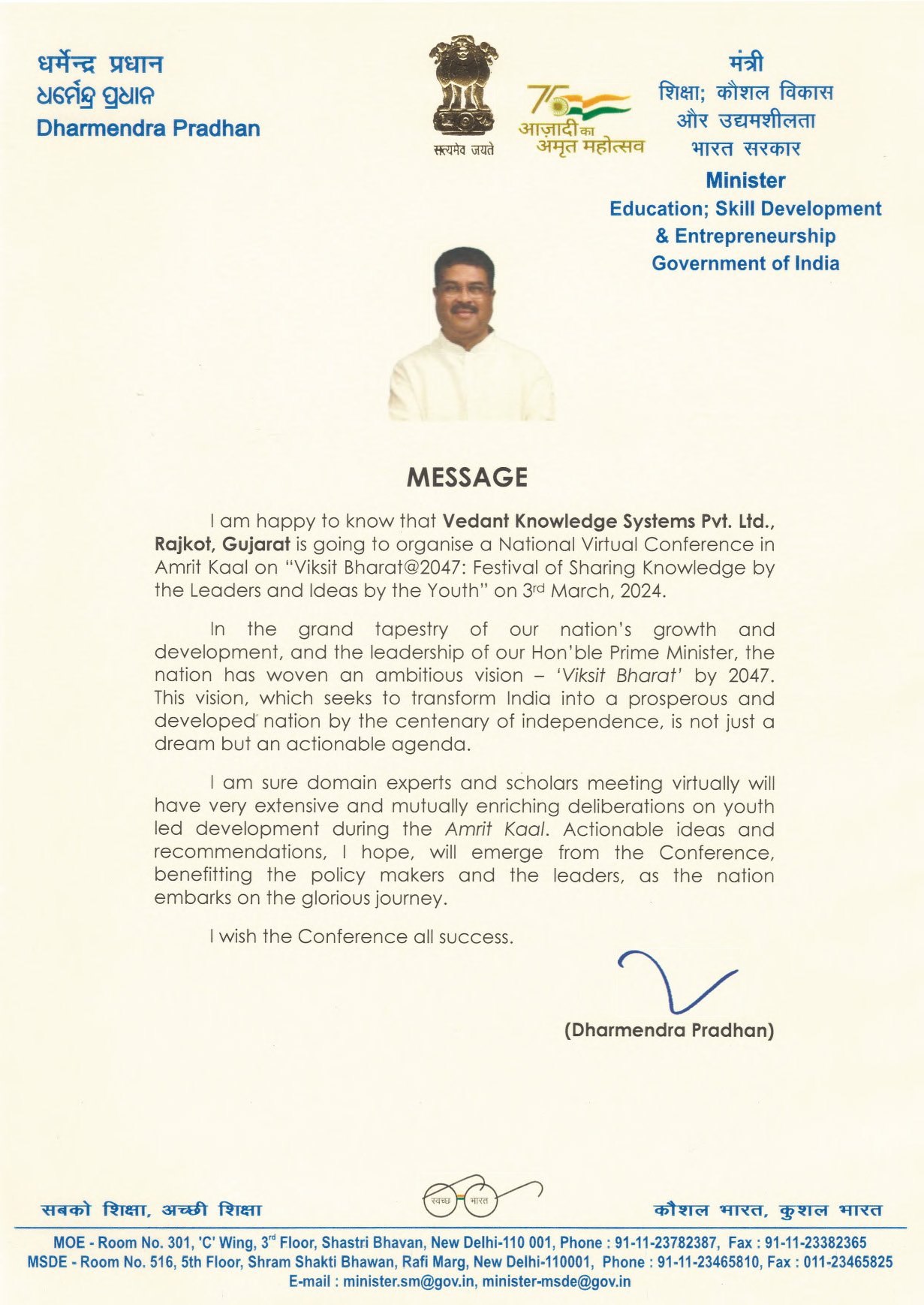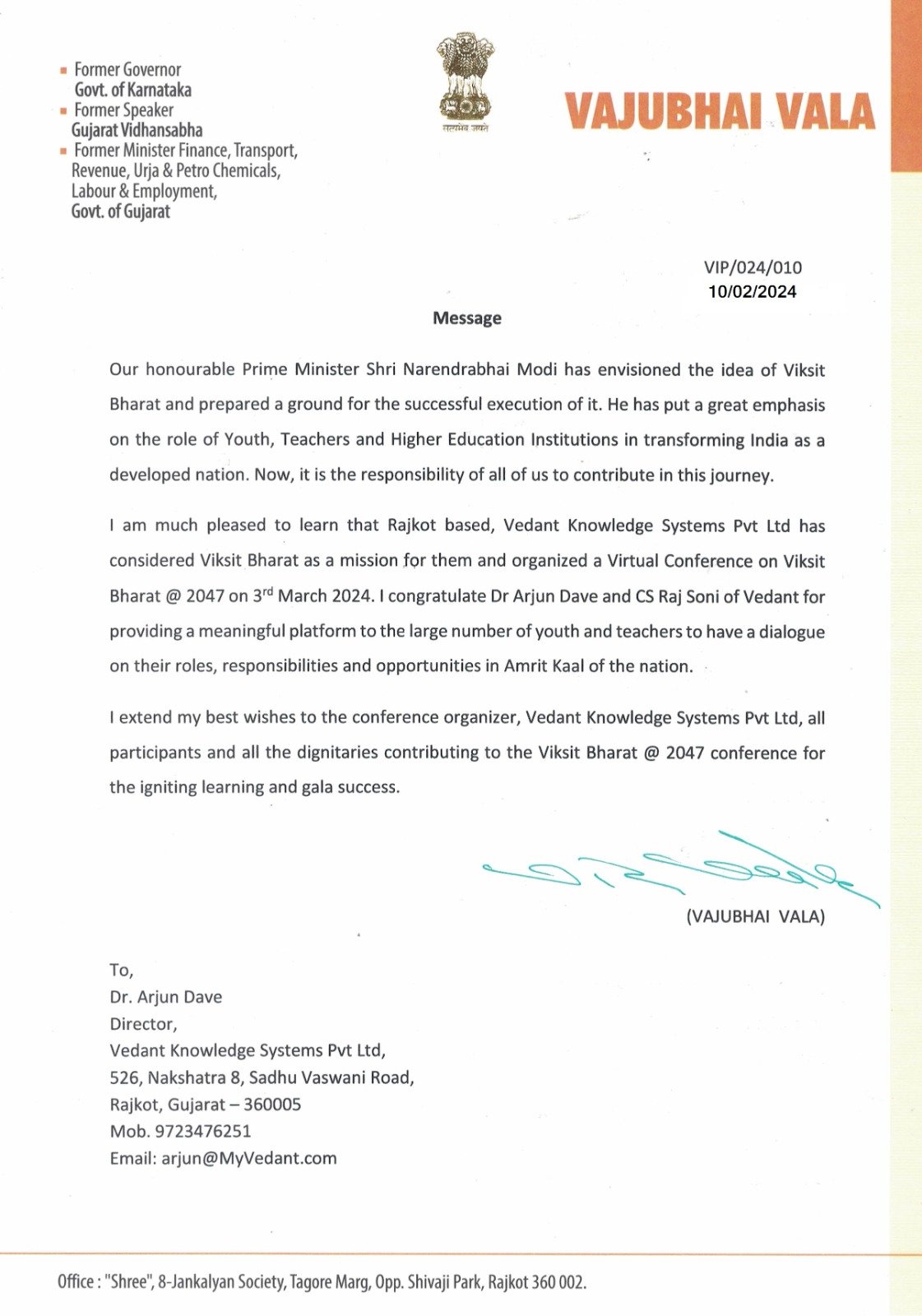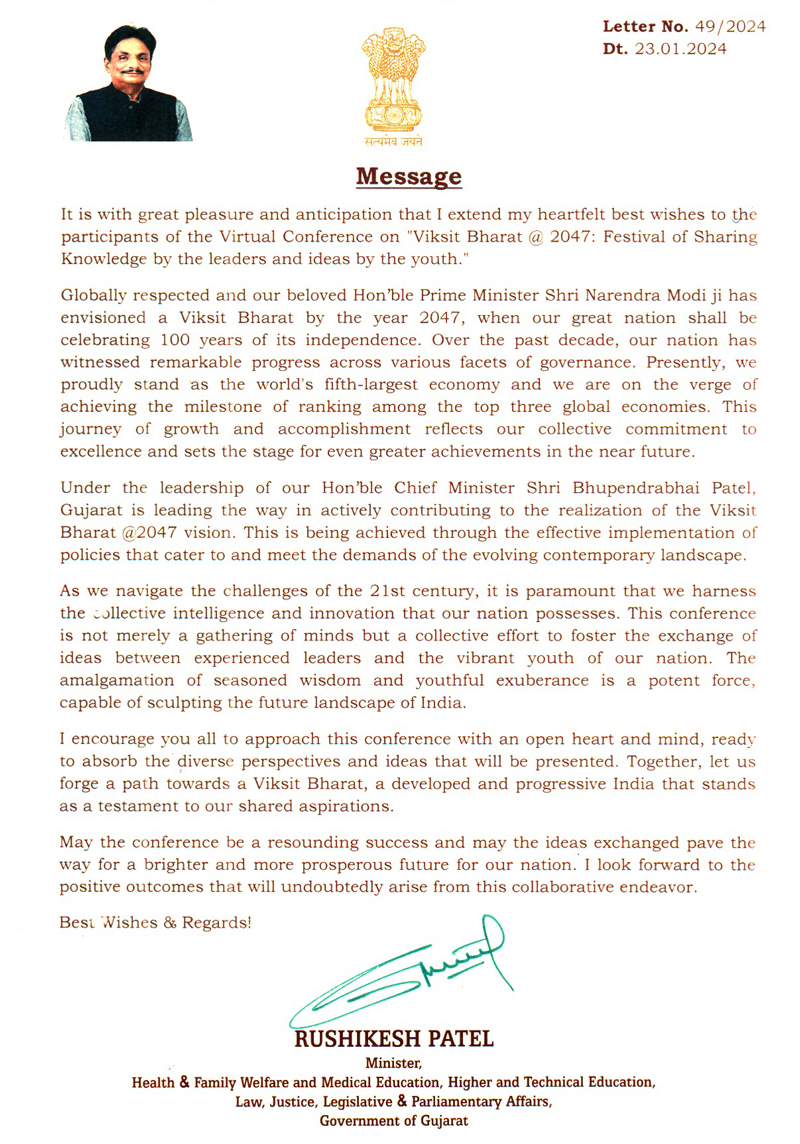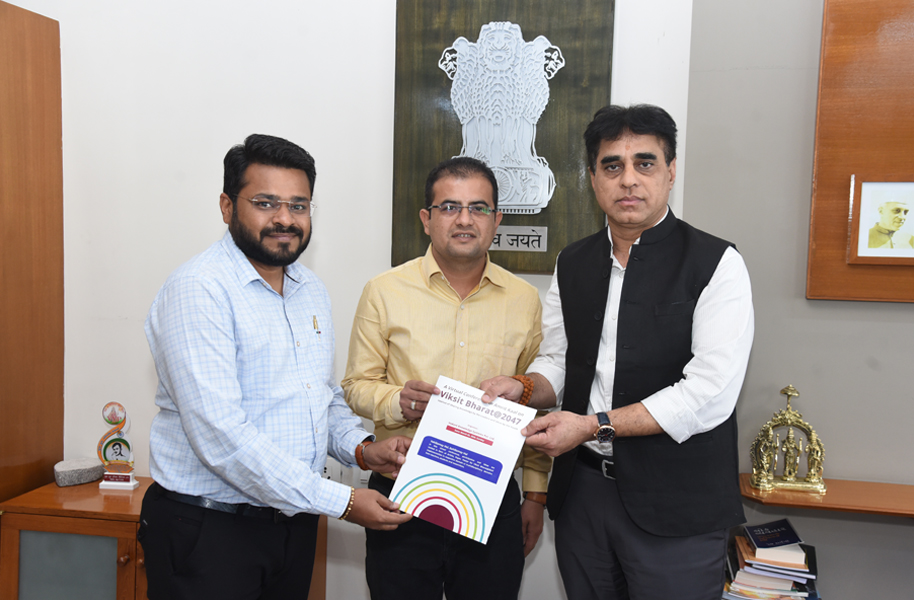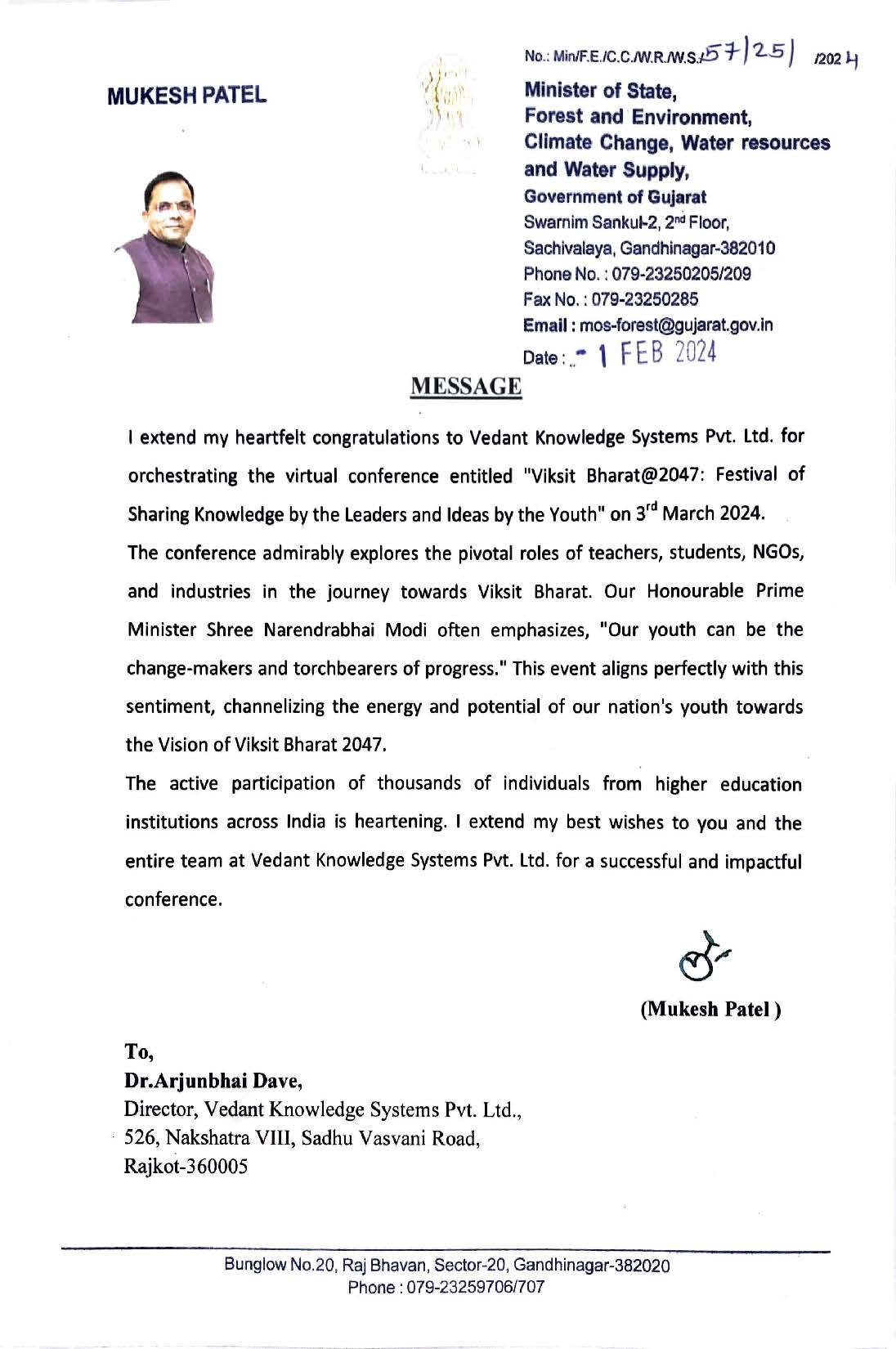INDIA’S BIGGEST VIRTUAL CONFERENCE
on
Sustainable Development Goals 2030: Bridging Gaps, Building Futures for Viksit Bharat@2047
A Multidisciplinary International Virtual Conference
Date: 18th to 22nd February 2025
Organized by:
Vedant Knowledge Systems Pvt Ltd

Conference Organizer:
Vedant Knowledge Systems Pvt. Ltd.
About Team Vedant
As the visionary organizers of this 11th Conference, Vedant Knowledge Systems Pvt. Ltd. is committed to fostering intellectual discourse, innovation, and societal progress. Team Vedant has humbly taken Vision of Viksit Bharat as their Mission and the present conference is 3rd Version of Viksit Bharat@2047 conferences touching thousands of youth and hundreds of educators. Vedant Talks a webinar series is started focusing on youth empowerment for realizing vision of Viksit Bharat. With a rich history of organizing impactful conferences and academic events, we believe in creating platforms that transcend boundaries and empower individuals with knowledge and resources. Since last 10 years, team Vedant is serving to various spheres of Education and Research domain at national and international levels in various capacities and earned many feathers in its crown. 50+ Universities, 200+ colleges and 50,000+ individuals’ have been served through Vedant’s meaningful interventions.
Prime Minister Shri Narendrabhai Modi
Team Vedant has been appreciated by the Prime Minister of India, Shri Narendrabhai Modiji for the continuous effort toward the Viksit Bharat@2047 Mission.
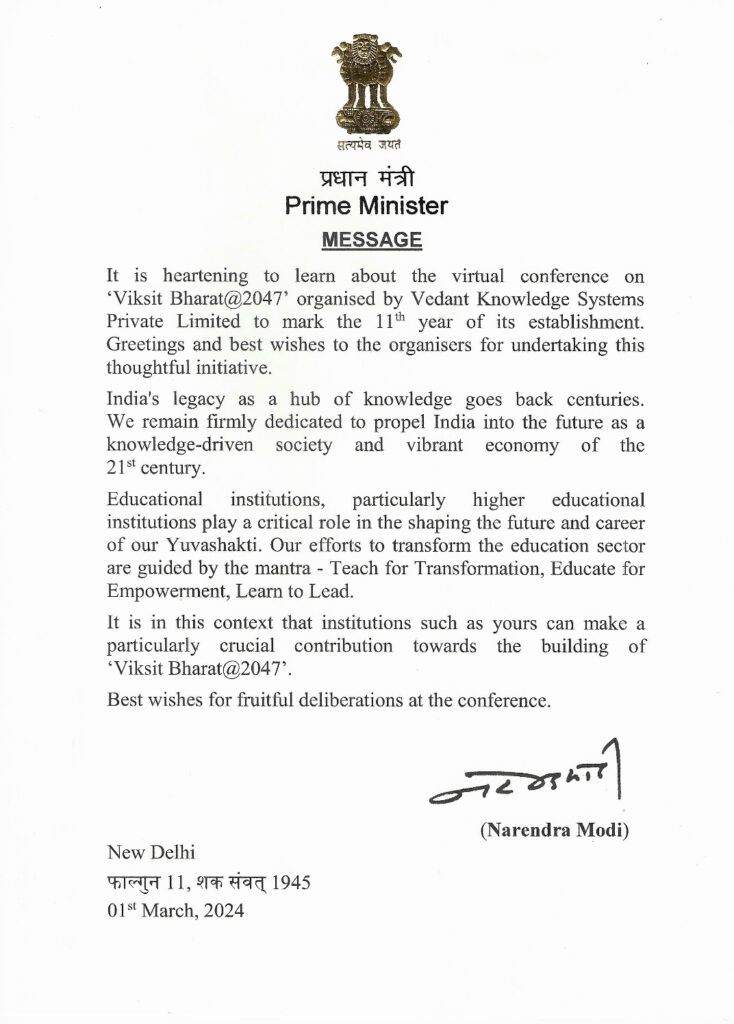
Minister Shri Amit Shah
Team Vedant has been appreciated by the Minister of Home Affaira, Shri Amit Shah for the continuous effort toward the Viksit Bharat@2047 Mission.

Knowledge Partner
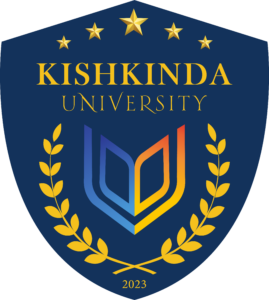
KISHKINDA UNIVERSITY
Mount View Campus, Off 28Kms, Ballari – Siruguppa Road,
Near Sindhigeri, GP NO.735, Hagaluru, Siruguppa Taluk,
Ballari – 583120, Karnataka
List of Memento Winners
Aman Bora
AMY SHARON JANET V
Ar. Neha Kapse
Asst. Prof. Chirag Sharma
Aswathy Rajesh
Christian Orlin Wilsonbhai
CMA SUJATA
Dinta Muralidharan
Dr Dayawant D Upadhyaya
Dr Jharna Ganguly
Dr Roop Kanwal
Dr. ASHA P PATHROSE
Dr. Paresh Jotangiya
Dr. G. Chiranjeevi Reddy
Dr. K. Hima Bindu
Dr. Karthika K.
Dr. Reeta Dwivedi
DR. SHRUTI SALVAN
Dr.Chandrasekharan Praveen
Gautam Bondyopadhyay
KAREENA K
M.S. Rajani Kanth
Meinam Sanjana Devi
More Srividya
Mr. Akshay K
Mr. Yash Walde
Mrs. P sri sita rama laxmi
Mrs. PARMINDER MITTER CHAUDHURI
Mrs. Rathod Mridula Raghunath
Mrs. Ritu Gupta
Mrs. Shambhavi Vikrant Holay
Mrs.Ummu Aimen
Ms Aishwarya Potphode
Ms. OLIPREYA DAS SARKAR
Ms. Priyankaben Maulesh Patel
Ms. Swati Anavatti
Ms. Tamanna
Nikita Nagar
Paras Kumar Prajapati
Partha Majumdar
PROF. MOHIYUDDEEN HAFZAL
RINKESHKUMAR G MAHIDA
Roshni Kanth
Rumana Anjum
Setturu Bharath
Shraddha Anawkar
Swathi
Tanmay Pradeep Kulkarni
Tarandeep Kaur
Tejinder Kaur Sahota
Tuba Tasis
Vibhoo Bajpai
Participate as Knowledge Partner or Guest
Institutes can participate as Conference Knowledge Partners.
The Chancellor, Vice Chancellor, Registrar, CEO, CFO, CTO can participate as Conference Guests.
Please contact Dr. Arjun Dave at +91 9723476251 to get further details. (Monday to Saturday, 10 AM to 8 PM IST)
Conference Videos
Day 1 – Inaugural
Day 1 – Participants Presentations and Session Chair Reviews
Day 2 – Inaugural
Day 2 – Participants Presentations and Session Chair Reviews
Day 3 – Inaugural
Day 3 – Participants Presentations and Session Chair Reviews
Why Biggest Conference?
-
1
Speakers and Engagement
70+ Speakers & Guests
500+ Session Chairs
50+ Subjects
1000+ Hours of Engagement -
2
Duration and Participation
5 days
10+ Countries
28 States & Union Territories of India Participating
2000+ Institutions Participating -
3
Reach and Impact
10,00,000+ Conference Reach
Celebrated Speakers, Policy Makers, Vice Chancellors, Academicians, Industry Professionals, Practitioners and Youth on Single Platform to Transform the VISION of VIKSIT BHARAT into MISSION
Why Should You Join?
Publication Opportunity
Selected papers will be published in Web of Science – UGC CARE Group 2 Indexed Journal
Awards & Felicitations
1) Young Scientist Award: Tablet + Award Trophy + E-Certificate
2) Research Ambassador Felicitation: Memento + E-Certificate
Conference Theme:
Sustainable Development Goals 2030
The conference focuses on the Sustainable Development Goals 2030, aiming to bridge gaps and build futures for Viksit Bharat@2047. This multidisciplinary approach brings together various stakeholders to discuss and strategize for India’s sustainable development.
The research paper/article/essay is invited based on any of the following research questions or any topic of your choice which is suitable to the conference theme. Instead of sub-themes, the research questions are provided below:
Research Questions Part 1
1. How can interdisciplinary research contribute to the successful achievement of the SDGs by 2030?
2. What are the key barriers to sustainable development in India, and how can different sectors collaborate to overcome them?
3. How can research institutions in India integrate the SDGs into their core agendas to support a Viksit Bharat@2047?
4. What role does innovation play in bridging the gaps between current progress and the SDGs, and how can it be fostered across disciplines?
5. How can data-driven research help track and accelerate progress towards the SDGs in India?
6. What are the ethical considerations in conducting research on sustainability and development, and how can they be addressed across disciplines?
7. How can collaborations between academia, industry, and government accelerate progress towards achieving SDGs by 2030?
8. What are the most effective communication strategies for promoting sustainable development goals within local communities and across sectors?
9. How can digital transformation and technological advancements support the achievement of the SDGs, and what are the challenges across disciplines?
10. What are the social, economic, and environmental impacts of current development policies in India, and how can research inform more sustainable practices?
Research Questions Part 2
11. How can research contribute to reducing inequalities (SDG 10) while fostering inclusive and sustainable growth in India?
12. What role does public awareness and education play in achieving the SDGs, and how can researchers contribute to raising awareness?
13. How can global partnerships for sustainable development (SDG 17) be strengthened through cross-disciplinary collaboration and research?
14. What are the research methodologies that can be applied across disciplines to assess and enhance progress toward the SDGs?
15. How can research in various fields address the sustainability challenges posed by climate change and environmental degradation (SDG 13)?
16. How can India’s National Education Policy 2020 support the achievement of SDG 4 (Quality Education) by 2030?
17. What are the key strategies for integrating sustainability into the curriculum of Indian schools and higher education institutions?
18. How can India bridge the digital divide in education to ensure inclusive and equitable learning for all?
19. What role does vocational training play in achieving sustainable livelihoods and contributing to SDG 8 (Decent Work and Economic Growth)?
20. How can educational innovations drive inclusive and quality education for marginalized communities in India?
Research Questions Part 3
21. What is the role of public health infrastructure in India in achieving SDG 3 (Good Health and Well-Being) by 2030?
22. How can India strengthen mental health services as part of its efforts to promote holistic well-being by 2047?
23. What are the challenges and opportunities for reducing maternal and child mortality rates in India in line with SDG targets?
24. How can telemedicine and digital health technologies address healthcare access gaps in rural India?
25. How can India’s traditional healthcare systems (e.g., Ayurveda) contribute to global health and well-being goals?
26. What are the challenges and potential solutions for achieving SDG 5 (Gender Equality) in India by 2030?
27. How can India address gender-based violence as a barrier to sustainable development?
28. What role do women entrepreneurs play in driving sustainable economic growth in India?
29. How can India ensure that gender equality is integrated into its vision for a Viksit Bharat@2047?
30. What are the policy interventions needed to reduce gender disparities in India’s STEM fields?
Research Questions Part 4
31. How can India leverage renewable energy technologies to achieve SDG 7 (Affordable and Clean Energy) by 2030?
32. What are the best practices for sustainable water resource management in India in alignment with SDG 6 (Clean Water and Sanitation)?
33. How can India balance rapid urbanization with the preservation of natural ecosystems?
34. What are the challenges and solutions for achieving net-zero emissions in India by 2047?
35. How can India enhance biodiversity conservation efforts to meet SDG 15 (Life on Land)?
36. How can India’s MSME sector drive innovation and sustainable industrialization in alignment with SDG 9 (Industry, Innovation, and Infrastructure)?
37. What are the economic implications of India’s transition to a circular economy by 2047?
38. How can India achieve inclusive economic growth while reducing inequalities (SDG 10) within and between regions?
39. What role does digital transformation play in fostering economic resilience and sustainability in India?
40. How can India balance its economic growth with environmental sustainability in the race towards Viksit Bharat@2047?
Research Questions Part 5
41. How can smart cities in India contribute to achieving SDG 11 (Sustainable Cities and Communities)?
42. What strategies are needed to ensure affordable housing and sustainable urban development in Indian cities?
43. How can urban infrastructure be made more resilient to climate change in India?
44. What are the best practices for managing waste in Indian cities to support SDG 12 (Responsible Consumption and Production)?
45. How can India enhance the sustainability of its transportation infrastructure by 2047?
46. What are the sustainable agricultural practices that can help India achieve SDG 2 (Zero Hunger) by 2030?
47. How can India leverage technology to enhance food security and reduce food waste?
48. What is the role of smallholder farmers in driving sustainable agricultural development in India?
49. How can India promote sustainable fisheries and aquaculture in alignment with SDG 14 (Life Below Water)?
50. How can agroecological practices contribute to climate resilience and food security in India?
Research Questions Part 6
51. What role does governance play in achieving sustainable development in India?
52. How can India’s policies foster global partnerships to support the achievement of SDG 17 (Partnerships for the Goals)?
53. What are the challenges and opportunities in implementing SDG-aligned policies across India’s diverse states and regions?
54. How can India improve public accountability and transparency to meet the SDG targets?
55. What are the key factors for effective policy implementation in achieving a Viksit Bharat by 2047?
56. How can India harness artificial intelligence and big data to accelerate the achievement of the SDGs?
57. What role does digital inclusion play in India’s pursuit of sustainable development?
58. How can India’s space technology contribute to SDG monitoring and achievement?
59. What are the opportunities for blockchain technology in enhancing transparency and efficiency in sustainable development projects?
60. How can technology be leveraged to promote sustainable tourism in India?
Research Questions Part 7
61. 10. Culture, Heritage, and Sustainability
62. How can India’s rich cultural heritage contribute to sustainable development and social inclusion?
63. What role does traditional knowledge play in India’s efforts to achieve SDG 13 (Climate Action)?
64. How can India promote cultural sustainability in the context of rapid urbanization and globalization?
65. What are the potential contributions of India’s arts and crafts sector to achieving the SDGs by 2030?
66. How can India integrate cultural heritage preservation with environmental sustainability in its vision for Viksit Bharat@2047?
67. How can libraries in India support the dissemination and accessibility of information related to the SDGs?
68. What role do digital libraries play in promoting sustainable education and lifelong learning in India?
69. How can library management practices evolve to better support research and innovation towards achieving the SDGs?
70. What strategies can Indian libraries adopt to preserve indigenous knowledge and cultural heritage in the context of sustainable development?
Research Questions Part 8
71. How can libraries collaborate with academic and research institutions to foster interdisciplinary research on the SDGs?
72. What sustainable management practices can Indian businesses adopt to align with the SDGs and contribute to a Viksit Bharat@2047?
73. How can corporate social responsibility (CSR) initiatives in India be optimized to support the achievement of the SDGs?
74. What are the challenges and opportunities for implementing sustainable supply chain management in Indian industries?
75. How can leadership development programs in India integrate sustainability and SDG-oriented strategies?
76. What role do startups and social enterprises play in driving sustainable economic growth and achieving the SDGs in India?
77. How can India’s financial systems and markets support sustainable investments aligned with the SDGs?
78. What are the economic impacts of transitioning to a green economy in India, and how can they be managed effectively?
79. How can e-commerce platforms in India contribute to sustainable consumption and production patterns (SDG 12)?
80. What strategies can Indian businesses adopt to enhance financial inclusion and reduce economic inequalities (SDG 10)?
Research Questions Part 9
81. How can trade policies in India be aligned with the SDGs to promote sustainable and equitable economic growth?
82. How can the Indian arts and culture sector contribute to promoting social inclusion and sustainable development?
83. What role do creative industries play in fostering sustainable communities and supporting the SDGs in India?
84. How can traditional Indian art forms be leveraged to raise awareness about environmental sustainability and climate action?
85. What are the opportunities for using digital media and technology in the arts to support the achievement of the SDGs?
86. How can cultural festivals and events in India be designed to promote sustainability and responsible consumption?
87. How can interdisciplinary research in the humanities contribute to a deeper understanding of sustainable development challenges in India?
88. What are the social and cultural barriers to achieving gender equality (SDG 5) in India, and how can they be addressed?
89. How can urban sociology inform the development of sustainable and inclusive cities in India?
90. What is the role of social movements and civil society in advocating for and achieving the SDGs in India?
Research Questions Part 10
91. How can historical perspectives on India’s development inform current strategies for sustainable growth and achieving the SDGs?
92. What are the impacts of globalization on social equity and sustainable development in India?
93. How can public policy analysis contribute to the effective implementation of SDG-related initiatives in India?
94. What role does media and communication play in shaping public perceptions and behaviours towards sustainable development in India?
95. How can educational reforms in the humanities and social sciences support the cultivation of sustainable and ethical leaders in India?
96. What are the implications of demographic changes in India for achieving the SDGs, and how can policies be tailored to address these challenges?
97. Interdisciplinary and Cross-Disciplinary Questions
98. How can collaborations between the arts, sciences, and social sciences enhance the effectiveness of SDG initiatives in India?
99. What integrated approaches can be developed to address multiple SDGs simultaneously within Indian communities?
100. How can technology and cultural heritage be combined to promote sustainable tourism in India?
101. What role does education in the humanities play in fostering sustainable innovation and entrepreneurship in India?
102. How can interdisciplinary research methodologies be applied to better understand and solve complex sustainability challenges in India?
| Aeronautical Engineering | Hotel Management |
| Agriculture | Human Rights |
| Anthropology | Information Technology (IT) |
| Architecture | Journalism, Mass Media and Communication |
| Ayurveda | Law |
| Biology | Liberal Arts |
| Biotechnology | Library Science |
| Biotechnology Engineering | Management |
| Botany | Mathematics |
| Chemical Engineering | Mechanical Engineering |
| Chemistry | Mechatronics Engineering |
| Civil Engineering | Medical |
| Commerce | Metallurgical Engineering |
| Computer Science | Microbiology |
| Computer Science | Nursing |
| Computer Science Engineering (CSE) | Para-medical |
| Cultural Studies | Performing Arts |
| Design Studies | Pharmacy |
| Economics | Philosophy |
| Education | Physical Education |
| Electrical Engineering | Physics |
| Electronics and Communication Engineering | Physiotherapy |
| English Language and Literature | Political Science |
| Entrepreneurship | Psychology |
| Environmental Science | Sanskrit Language and Literature |
| Film Studies | Social Work |
| Fine Arts | Sociology |
| Foreign Languages | Statistics |
| Geography | Tourism |
| Geology | Vedanta Literature |
| Gujarati Literature and Language | Veterinary Sciences |
| Hindi Language and Literature | Zoology |
| History |

International Participation
With 10+ countries participating alongside 28 States & Union Territories of India, this conference truly represents a global platform for discussing sustainable development and India’s future.
-
Conference Registration Fee
Indian Participant: Rs. 1500
Foreign Participant: Rs. 1500 -
Publications APC: Peer Reviewed Google Scholar Indexed Journal
Indian Participant: Rs. 2000
Foreign Participant: USD 100 -
Publications APC: Web of Science (UGC CARE Group 2) Indexed Journal
Indian Participant: Rs. 27,000
Foreign Participant: USD 950
Join INDIA’S BIGGEST VIRTUAL CONFERENCE
Join us in this INDIA’S BIGGEST VIRTUAL CONFERENCE of Vedant as we collectively contribute to the roadmap of Viksit Bharat@2047 a future that we envision and strive to build together.
Conference Registered Participants
Click here to view the participants registered for the conference.
Conference Session Chair
Click here to view the Session Chairs registered for the conference.
Appreciation Letters from Dignitaries to Team Vedant
- Prime Minister Shri Narendrabhai Modi
- Central Education Minister, Shri Dharmendra Pradhan
- Chief Minister of Gujarat, Shri Bhupendrabhai Patel
- Shri Vajubhai Vala, Former Governor of Karnataka
- Minister Shri Rushikeshbhai Patel
- Minister Shri Balvantsinh Rajput
- Minister Shri Prafulbhai Pansheriya
- Minister Shri Mukeshbhai Patel
Conference Details
- Conference Concept Note
- Publication Details
- Impact and Reach
- Join the Movement
- Awards and Felicitations
- Objectives of the Conference
- Call for Paper
- Process & Important Dates of the conference
- Conference Days Highlights
- Viksit Bharat@2047: The Vision
- Multidisciplinary Approach
- Youth Empowerment
- Building Eco-system for Sustainable Development
As the world approaches the 2030 deadline for achieving the Sustainable Development Goals (SDGs), it is crucial for India to not only contribute to this global endeavor but also to align it with its national vision of a Viksit Bharat@2047—a developed and inclusive India by the centenary of its independence. This international research conference seeks to foster cross-disciplinary discussions, engage diverse stakeholders, and catalyze innovative solutions to accelerate progress toward the SDGs, while preparing India for a sustainable, inclusive, and prosperous future.
Accepted papers will be published in Peer Reviewed International Journal. Selected and/or best papers may be extended for WoS Indexed journal special issues. The publication fees and options are given below:
Option 1: Vidhyayana – Peer-Reviewed, Google Scholar Indexed Journal. ISSN: 2454-8596
Option 2: The Scientific Temper – Web of Science (UGC Care Group 2) Indexed Journal. ISSN: 0976-8653. E-ISSN: 2231-6396
You will have choice to select a journal at the time of Conference Paper Upload.
One Main Author and Maximum Two Co-Authors are allowed.
With a conference reach of 10,00,000+, 2000+ participating institutions, and 1000+ hours of engagement, this virtual conference promises to have a significant impact on discussions surrounding sustainable development and India’s future.
By participating in this conference, you become part of a larger movement towards achieving the Sustainable Development Goals and realizing the vision of Viksit Bharat@2047. Your contributions can help shape policies, drive innovation, and create a sustainable future for India and the world.
|
Title |
Young Scientist Award |
Research Ambassador Felicitation |
|
Categories |
1. Educator 2. Research Scholar (PhD) 3. Student (Undergraduate, Postgraduate) |
50 selected conference participants |
|
Token of Appreciation |
Tablet, Award Trophy, Certificate |
Memento, Certificate |
Realizing Viksit Bharat@2047
To realize the vision of Viksit Bharat@2047 by taking it into Mission Mode through building eco-system for a sustainable development, holistic growth of youth and empowering larger communities.
Collaboration Platform
To create a platform for diverse scholars and practitioners to collaborate on multidisciplinary solutions addressing multiple SDGs.
Aligning Vision
To explore how India’s vision for Viksit Bharat@2047 aligns with the global SDG agenda for 2030.
Promoting Innovation
To promote innovative practices, policies, and technologies to bridge gaps and build resilient, sustainable communities.
The professors, UG-PG Students, Researcher Scholars, and Industry Professionals are invited to contribute their original Paper/ Article/ Essay from all subjects including Arts, Commerce, Management, Social Sciences, Sciences, Computer Science, Engineering, Pharmacy, Physiotherapy, Ayurveda, Education, Physical Education, Library Science, Agriculture, Hotel Management, Tourism, Architecture, Law, Human Rights, Journalism, Para-medical, Literature, Language, Performing Arts, Social Work, Design, Liberal Arts, Medical, Media etc. domains and not limited to these. All technical or non-technical topics allied with the theme of conference are accepted.
Accepted Languages: English, Hindi, Sanskrit, Punjabi, Marathi and Gujarati
-
1
Conference Registration & Fee Payment
Last Date: 10th January 2025 -
2
Pre-Recorded Conference Video Presentation Submission and Conference Paper/Article/Essay Submission
Last Date: 10th January 2025 -
3
Conference Submission Review – Corrections / Acceptance / Rejection
Within 7 days from the submission -
4
APC Payment on Acceptance of Your Submission
Within 7 days from the acceptance -
5
Session Chair Feedback on Each Paper
18th to 22nd February 2025 -
6
Conference Days
18th to 22nd February 2025 -
7
Issuing Certificates of Conference Presentation/ Participation
Before 22nd April, 2025 -
8
Paper publications in Peer-Reviewed Journal
Before 30th May, 2025 -
9
Paper Publications in Web of Science (UGC CARE Group 2) Indexed Journal
Before 30th August, 2025
All recorded speeches, keynote talks, plenary speeches, announcement of Young Scientist Award, announcement of Research Ambassador Felicitation will be streamed live and all presentations, session chair feedback sessions will be posted on our official FB & YouTube Pages. No need to join any zoom or google meet.
Viksit Bharat@2047 represents India’s vision for becoming a developed nation by its centenary of independence. This conference aims to align this national vision with the global SDG agenda, fostering discussions on how to achieve both simultaneously.
-
Diverse Fields
The conference welcomes contributions from various fields including Arts, Sciences, Engineering, Medicine, and more.
-
Holistic Solutions
By bringing together different disciplines, the conference aims to foster innovative and comprehensive solutions to complex challenges.
-
Cross-pollination of Ideas
The multidisciplinary nature encourages the exchange of ideas across different domains, leading to unique insights and collaborations.
The conference places a strong emphasis on youth empowerment, recognizing the crucial role of young minds in shaping India’s future. Through initiatives like the Young Scientist Award and Research Ambassador Felicitation, it aims to encourage and recognize young talent.
-
1
Research
Encouraging cutting-edge research in sustainable development
-
2
Collaboration
Fostering partnerships between academia, industry, and government
-
3
Implementation
Translating research into actionable policies and practices
-
4
Monitoring
Continuous assessment of progress towards SDGs and Viksit Bharat@2047
Total Visitors: 31060
Today's Visitors: 1

